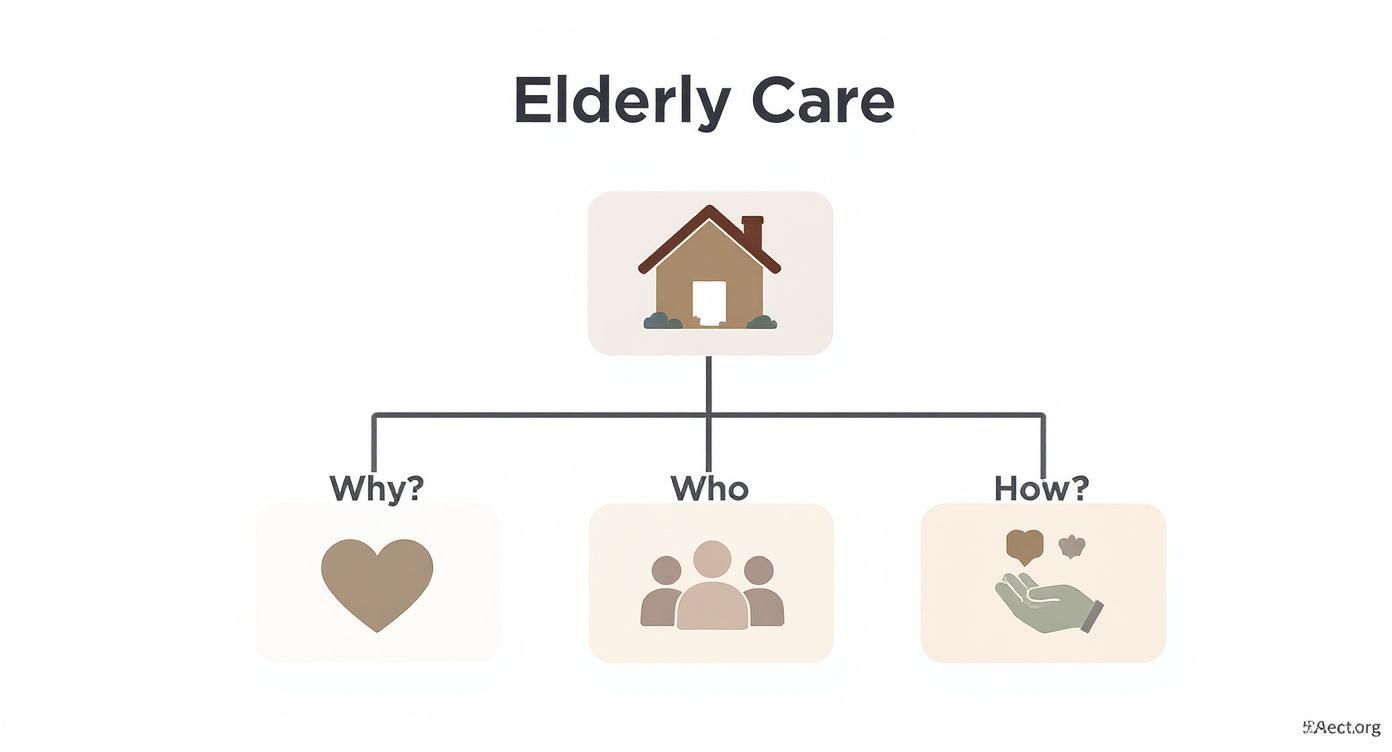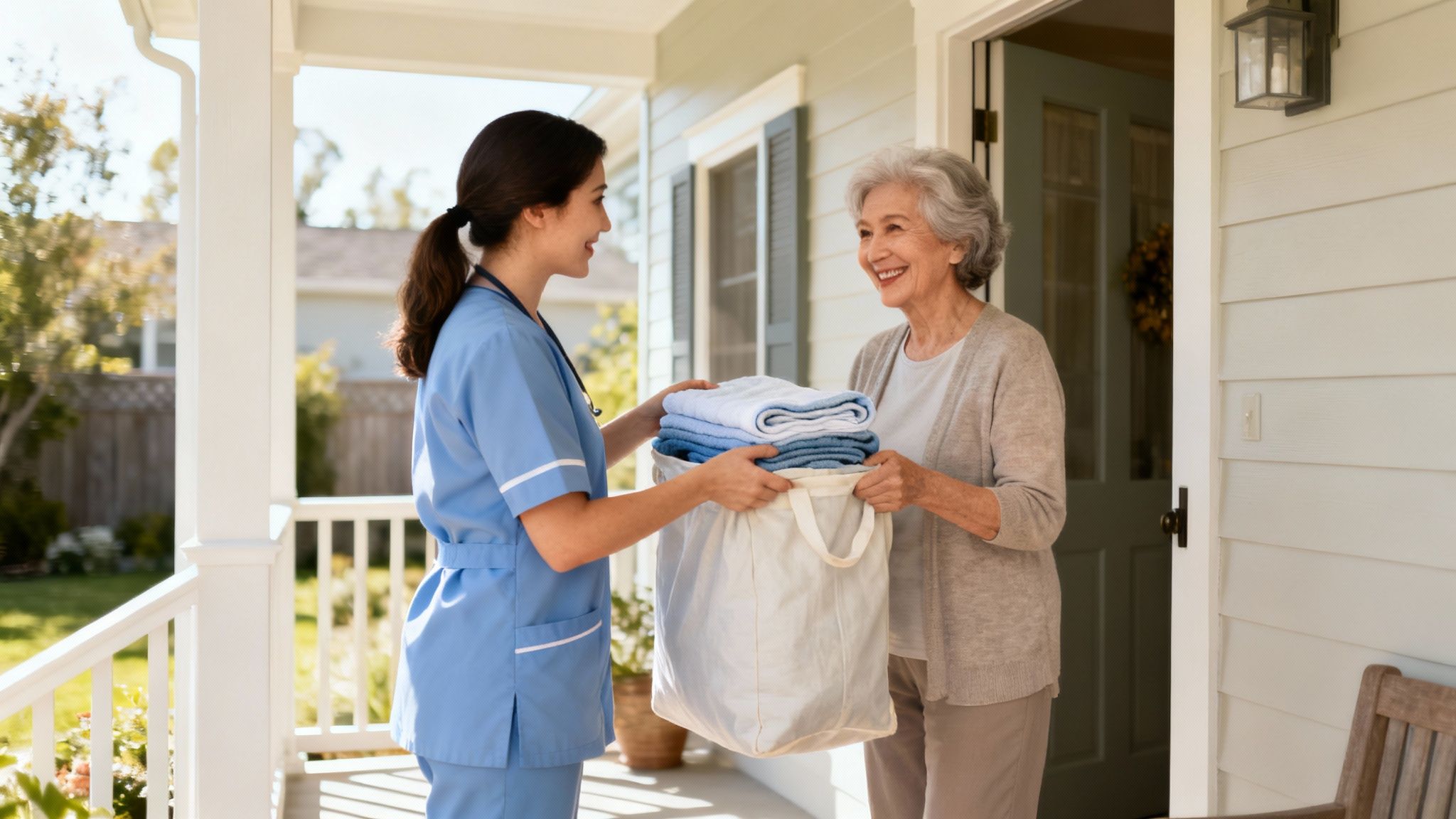Home Services for Elderly: A Guide to Supporting Independence
- Sarah Huber
- Nov 11, 2025
- 10 min read
"Home" is more than just a place; it's a feeling of comfort, familiarity, and independence. This is especially true for older adults, which is why the desire to "age in place" is a deeply personal choice to remain in a cherished environment. Home services for the elderly have become essential, providing the support that allows loved ones to live safely and with dignity right where they belong.
As families seek the best ways to provide care, understanding the available services is the first step. From personal assistance to practical household help, these services form a support system that honors an individual's desire for independence.
The Comfort of Home: Why Seniors Prefer Aging in Place
The emotional anchor to one's own home is powerful. It’s the comfort of a favorite chair, the view from a familiar window, and the routines that provide a sense of stability when other parts of life may be changing. Staying home means maintaining personal freedom and holding onto a crucial feeling of self-reliance.
The data supports this preference. The global home care market is growing, with a staggering 82% of seniors wanting to stay in their own homes as they age. With 44% needing assistance with daily activities, the demand for reliable in-home services has never been higher. You can discover more insights about these elderly care industry trends to see how families are adapting.
The Role of Independence and Familiarity
Aging in place is about preserving control over one's life. The small choices we take for granted—what to eat, when to rest—are a huge part of feeling autonomous. This sense of independence is fundamental to a high quality of life.
Familiarity also plays a critical role in safety. Knowing the layout of your home reduces the risk of falls and other accidents. This comfort extends to the local community, from the neighborhood grocery store to nearby friends and family.
Staying at home isn't just about comfort; it's about preserving an individual's identity and connection to their life's story. Home services make this possible by bridging the gap between independence and the need for assistance.
The goal is to build a support network that respects a senior's independence while ensuring their safety and well-being. By bringing essential services to their doorstep, we help our loved ones thrive in the place they know and love best.
Your Guide to the 7 Main Types of Home Care Services
Navigating home care services can feel overwhelming at first. The key is to understand that you don’t need every service—just the right ones to create a custom support system. Some services provide hands-on personal help, while others handle the essential chores that keep a household running smoothly.
By understanding what each type of service offers, you can create a plan that fits your loved one’s needs. This helps them stay independent and safe at home.
This diagram helps visualize how different services work together. They branch from the central goal—supporting a senior at home—by addressing the reasons for care, the people involved, and the practical methods.

Great home care is a complete system that combines emotional support, professional assistance, and practical help to preserve a senior's quality of life.
Here is a brief overview of the main types of services available.
Service Category | Common Tasks | Primary Benefit |
|---|---|---|
Personal Care | Bathing, dressing, grooming, mobility assistance | Supports personal dignity and basic daily self-care. |
Homemaking/Chores | Light housekeeping, laundry, running errands, grocery shopping | Maintains a safe, clean, and orderly living environment. |
Home Health Care | Skilled nursing, physical/occupational therapy, wound care | Provides medical-level care and rehabilitation at home. |
Companionship | Conversation, playing games, accompanying to appointments | Reduces loneliness and provides vital social interaction. |
Transportation | Driving to medical appointments, social events, or stores | Ensures safe and reliable access to the community. |
Meal Delivery | Delivering prepared meals (e.g., Meals on Wheels) | Guarantees access to regular, nutritious food. |
Home Modifications | Installing grab bars, ramps, stairlifts | Adapts the physical home for safety and accessibility. |
This table provides a high-level view. Let's look closer at what a few of these mean for your loved one.
1. Personal Care and Companionship
This service provides direct, hands-on support. Personal care aides assist with Activities of Daily Living (ADLs), which are the fundamental tasks of self-care. Just as important is companionship, which focuses on emotional and social well-being to combat loneliness.
Typical tasks include:
Helping with bathing, dressing, and grooming to maintain personal hygiene.
Providing mobility support, such as help getting out of bed or walking safely.
Preparing simple meals and offering medication reminders for health management.
Engaging in conversation, sharing hobbies, or accompanying to appointments.
2. Homemaker and Chore Services
While personal care focuses on the individual, homemaker services focus on the home environment. For many seniors, household chores can become physically draining or even dangerous. These services are crucial for maintaining a safe and stress-free living space.
Homemaker services are the practical foundation of aging in place. They handle the physically demanding tasks that can become barriers to independence, allowing seniors to conserve their energy for the things they enjoy.
These services tackle everyday jobs like light housekeeping, grocery shopping, and running errands.
One of the most valuable chore services is professional laundry assistance. Carrying heavy baskets, bending to use machines, and standing to fold clothes can be a significant fall risk. You can find more information about how residential laundry services for every lifestyle offer a safe and affordable solution. Removing this one task can make a huge difference in a senior's daily safety and comfort.
When Professional Medical Support at Home Is Necessary
While personal care and housekeeping services help create a safe home, some situations require skilled medical support. Home health care provides clinical services delivered by licensed professionals, such as registered nurses or physical therapists. This level of care is typically prescribed by a doctor after a hospital stay, an injury, or to manage a complex health condition.
This specialized care is often needed for long-term health issues. Nearly 95% of people over 60 have at least one chronic condition, and almost 80% manage two or more. It's no surprise that 86% of home health care patients are age 65 or older, requiring ongoing medical oversight to stay healthy at home. You can dig deeper into these home health statistics to see how significant this need is.
Scenarios Requiring Skilled Medical Care
Knowing when to call a licensed professional is critical for a senior's safety. Home health care is essential when a task requires clinical expertise beyond what a non-medical caregiver is trained to do.
Common situations requiring professional medical support include:
Medication Management: Administering injections, managing IVs, or overseeing complex medication schedules where an error could be dangerous.
Wound Care: Cleaning, dressing, and monitoring surgical wounds or pressure sores to prevent infection and ensure proper healing.
Post-Surgery Rehabilitation: Guiding a patient through prescribed exercises to regain strength and mobility safely after a procedure.
Chronic Disease Monitoring: Tracking vital signs, managing symptoms, and educating the patient and family on how to manage conditions like diabetes or heart failure.
Home health care acts as a critical bridge between the hospital and home. It empowers seniors to recover and manage their health in a familiar setting, significantly reducing the risk of complications and hospital readmissions.
By including skilled medical professionals in a care plan, families can feel confident their loved one is receiving expert clinical attention. This professional support is key to managing complex conditions effectively and improving quality of life.
Supporting Independence with Everyday Household Help

While skilled medical care addresses specific health issues, managing daily household tasks is often the secret to successful aging in place. For many older adults, the physical toll of chores can become a major obstacle to independence, leading to exhaustion, stress, and a higher risk of accidents.
Practical home services for elderly people handle the non-medical tasks that keep a home safe and comfortable. This support is about conserving energy and boosting overall well-being. When seniors can delegate physically demanding jobs, they free up their strength for activities they enjoy, like hobbies and family visits.
The Power of Homemaker Services
Homemaker services, also known as chore services, tackle a range of tasks that keep a home running smoothly. These can include light housekeeping, grocery shopping, running errands, and preparing meals. It’s not just about cleanliness; it’s about creating a living space where an older adult can flourish without the physical burden of constant upkeep.
Think of it as a practical safety net. A clutter-free floor reduces trip hazards, and having groceries delivered avoids navigating busy stores with heavy bags. These small supports add up to make a significant difference in daily life.
By taking over the heavy lifting of household management, homemaker services give seniors the power to stay in control of their surroundings and live more comfortably on their own terms.
This type of help is a proactive way to support independence before small struggles become major challenges.
A Focus on High-Impact Chores Like Laundry
Some chores are more physically demanding than others, and laundry is a perfect example. Hauling heavy baskets, bending to load and unload machines, and standing to fold can be tiring and present a serious fall risk for many seniors.
A professional laundry pickup and delivery service removes this entire burden.
Prevents Falls: Eliminates the need to carry heavy loads up or down stairs.
Conserves Energy: Frees up physical reserves for more enjoyable activities.
Ensures Cleanliness: Guarantees a steady supply of fresh clothes and linens, which is essential for hygiene and comfort.
For families in the Phoenix area, GoGet My Laundry provides a simple and affordable solution. With residential service starting at just $1.69 per pound including free pickup and delivery, it's a practical addition to any senior’s support plan. You can learn more about these hassle-free laundry solutions for seniors living alone and see how much of a difference this service can make. Integrating practical home services for elderly loved ones is a smart way to help them maintain their independence and live well at home.
How to Choose the Right Home Service Provider

Allowing someone into a loved one's home is a decision that requires trust. By knowing what to look for and what questions to ask, you can confidently find a partner who fits your family’s needs. The goal is to find a provider who is professional, reliable, and gives you peace of mind.
Vetting Potential Providers
Before signing a contract, it's important to do your homework. This is about protecting the person you care for and ensuring you're working with a legitimate company. A professional agency should be transparent about its qualifications.
Always ask for proof that the provider is licensed, bonded, and insured. These are essential safeguards that protect you, your loved one, and the provider's employees from liability.
Trust is the cornerstone of all in-home care. A provider's willingness to openly share their credentials, training protocols, and insurance details is a direct reflection of their professionalism and commitment to client safety.
Ask about their employee screening process, including background checks and staff training. The answers will reveal a lot about the quality and dependability you can expect.
Questions to Ask During an Interview
Once you have a shortlist, it's time to talk to providers. This is your chance to understand their approach and see if it aligns with your needs. The same principles apply whether you're hiring a personal care aide or a chore service. For tips on choosing a service for specific tasks, this guide on how to choose the right laundry service for your home offers helpful advice.
Having a checklist of questions ready can help you cover all important bases and compare providers fairly.
Checklist for Vetting Home Service Providers
Here are the essential questions to ask any potential provider to ensure they meet your standards.
Category | Key Questions to Ask |
|---|---|
Credentials & Safety | Are you licensed, bonded, and insured? What are your emergency protocols? |
Staffing & Training | How do you screen and train your employees? Do you offer ongoing education? |
Services & Costs | Can you provide a detailed list of services and a clear pricing structure? Are there any hidden fees? |
Client Communication | How do you handle client feedback or complaints? Who is our main point of contact? |
Contracts & Flexibility | What does your service agreement include? Can we adjust services as needs change? |
Asking these direct questions helps you gather the information needed to make a sound decision. A reputable company will provide clear answers, helping you find a partner who will provide excellent home services for elderly loved ones.
Weaving Together a Flexible and Supportive Senior Care Plan
The best support systems are flexible and adapt to a loved one's changing needs. Building a care plan is like weaving a safety net—by layering different home services for the elderly, you create a comprehensive system of support. This approach combines various types of help to keep your loved one safe, healthy, and as independent as possible.
For example, a home health aide may visit weekly, meals can be delivered daily, and a laundry service can handle pickup and drop-off. Each service solves a specific problem, and together they form a powerful yet unobtrusive support plan.
Start Small with Services That Make a Big Difference
The flexibility of this approach allows you to scale care up or down as needed. You can start with one or two services that address an immediate challenge, like a physically demanding chore. This way, your loved one gets the right help without feeling overwhelmed.
A successful care plan isn’t about grand gestures. It's built on a foundation of practical, reliable support that quietly works in the background. By integrating these services, you create a system that preserves dignity, promotes well-being, and gives the whole family priceless peace of mind.
For families in the Phoenix area, removing just one difficult task from a senior’s to-do list can be a great first step. Relieving them of the physical strain of laundry helps prevent falls and saves their energy for things they enjoy.
Experience the easiest way to do laundry — book your pickup now. You can schedule your first laundry pickup today.
Common Questions About In-Home Care for Seniors
Entering the world of in-home care brings up many questions. Getting clear answers is the first step toward making confident decisions for your family. Here are some of the most common inquiries about home services for an aging loved one.
What Is the Difference Between Home Care and Home Health Care?
The names are similar, but the services are distinct. Home care provides non-medical help with everyday life, such as bathing, meal preparation, or light housekeeping. The goal is to support daily routines and help your loved one stay safe and independent.
Home health care is skilled medical care prescribed by a doctor. A licensed professional, like a nurse or physical therapist, provides specific treatments at home, such as wound care or post-surgery rehabilitation. Many seniors benefit from a combination of both services.
How Much Do Home Services Cost in Phoenix?
Costs vary depending on the type and frequency of service. In the Phoenix area, non-medical in-home aides typically charge between $25 and $40 per hour. However, a budget-friendly strategy is to outsource specific, challenging tasks rather than hiring a full-time caregiver.
For example, laundry can be a physically demanding chore. A dedicated laundry pickup and delivery service, with prices starting at just $1.69 per pound, offers an affordable way to handle this task, keeping the home clean and safe without a high hourly cost.
How Do I Know When It's Time for Home Services?
The signs are often subtle at first. You might notice a parent having more trouble with mobility, forgetting medications, or neglecting personal grooming. A messy home can also be a red flag.
Starting small is often a good approach. Introducing a non-intrusive service, like meal delivery or a professional laundry service, can be an easy first step. This helps your loved one get used to receiving help while immediately making their life easier.
By implementing practical solutions, you can build a support system that creates a safer, more comfortable home. For an easy way to lighten the load, let GoGet My Laundry handle the laundry.
Schedule your laundry pickup today at www.gogetmylaundry.com. You can schedule your first laundry pickup today and see what a difference it makes.

Comments